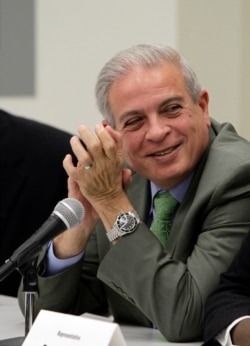The United States Agency for Global Media (USAGM) is investigating allegations that a reporter for its TV Marti service, mandated to broadcast objective news into Cuba, faked a mortar attack during a televised report from Nicaragua.
The TV Marti reporter at the center of the fake news allegations is Tomas Regalado Jr., the son of the director of the Office of Cuban Broadcasting, Tomas Regalado Sr. The elder Regalado has made a priority of raising journalistic standards and practices after the government-funded broadcaster aired anti-Semitic content calling liberal philanthropist George Soros "a non-believing Jew of flexible morals."
Alleged staging
Spanish language media sites CiberCuba and Cubanos por el Mundo recently called into question the validity of a 2018 Marti report, which showed Regalado Jr. reporting from a street in Managua, the capital of Nicaragua, when a small explosion occurred directly behind him.
These independent Cuban media sites acquired footage that seems to show the attack was staged to make it appear that the journalist was under fire. The video shows masked men firing a small explosive charge from homemade mortar; the camera then swings to focus on Regalado Jr. as he jogs forward amid general laughter by all involved.
Regalado Jr. and the Marti cameraman who shot the suspect report, Rodolfo Hernandez, have been suspended, pending a USAGM investigation.
In December, Hernandez was awarded the USAGM David Burke Distinguished Journalism Award for his "intrepid determination and enthusiastic reporting" from Nicaragua and other countries in the region.
USAGM CEO John Lansing said in an email Tuesday that he takes "seriously any breach of professional journalistic standards at any USAGM network." He also said he expects all agency "networks to adhere to truthfulness, fairness and accountability in their reporting."
Credibility issues
Alex Otaola of the interest group Cubanos por el Mundo was one of the first to post the video exposing the alleged fraud. If the incident was indeed faked, such media manipulation damages the credibility of all news organizations and opposition groups trying to reach audiences in Cuba, where the Communist government tightly controls official media outlets, he said.
"If it is proven that what they did and why they did it after an investigation that one hopes will be carried out, and the conclusion is it is indeed fake news, then this undermines all the people who have decided to raise their voices to fight for and achieve a free Cuba," Otaola said on his weekly YouTube program Hola Ota-Ola.
Regalado Sr., the OCB director and former mayor of Miami, told The New York Times he has recused himself from the investigation into his son and that he plans to continue in his leadership role with the organization.
Earlier this year USAGM, which oversees taxpayer-financed international broadcasting including Voice of America, commissioned an independent expert panel of journalists and academics to review OCB programming for "patterns of unethical, unprofessional, biased or substandard journalism." The highly critical audit found "little or no attempt" to produce balanced reporting at both Radio and TV Marti, and that "well-established norms of objectivity are routinely disregarded in favor of propagandistic communications tactics."
A joint USAGM-OCB working group has since been formed to update journalistic standards and practices, along with improving the management structure.
Based in Miami, OCB oversees Radio Marti, which began in 1985, followed by TV Marti five years later. In 2018, OCB received more than $29 million in federal funding. Marti broadcasts reach an estimated 11 percent of the Cuban population, but its TV signal is often jammed by the Cuban government.
Radio and TV Marti have long been faulted for bad journalism and propaganda by both the State Department and congressional investigations.
The controversy over the Soros segment, originally broadcast in May 2018, became public months later after a blogger exposed it. Lansing had denounced the Soros segment as "deeply offensive" and nine Marti staffers were terminated, resigned or put on probation for their roles in the controversial production.
Past controversies
USAGM also dealt with other serious journalist ethical violations. A senior employee of the U.S. Agency for Global Media recently pleaded guilty to stealing nearly $40,000 in government funds by falsifying hotel and taxi receipts, and billing the agency for personal trips to promote his book and weekend trips.
In October, 15 journalists from the VOA Hausa language service were fired or disciplined for accepting bribes from a Nigerian official. And the chief of the VOA Mandarin language service was discharged for allowing a billionaire Chinese exile to make unsubstantiated charges against officials in Beijing during an extended live broadcast.
Both Lansing and VOA Director Amanda Bennett were appointed by former President Barack Obama.
President Donald Trump has selected Michael Pack, a conservative filmmaker, to head the USAGM but the Senate has yet to vote on the nomination.







